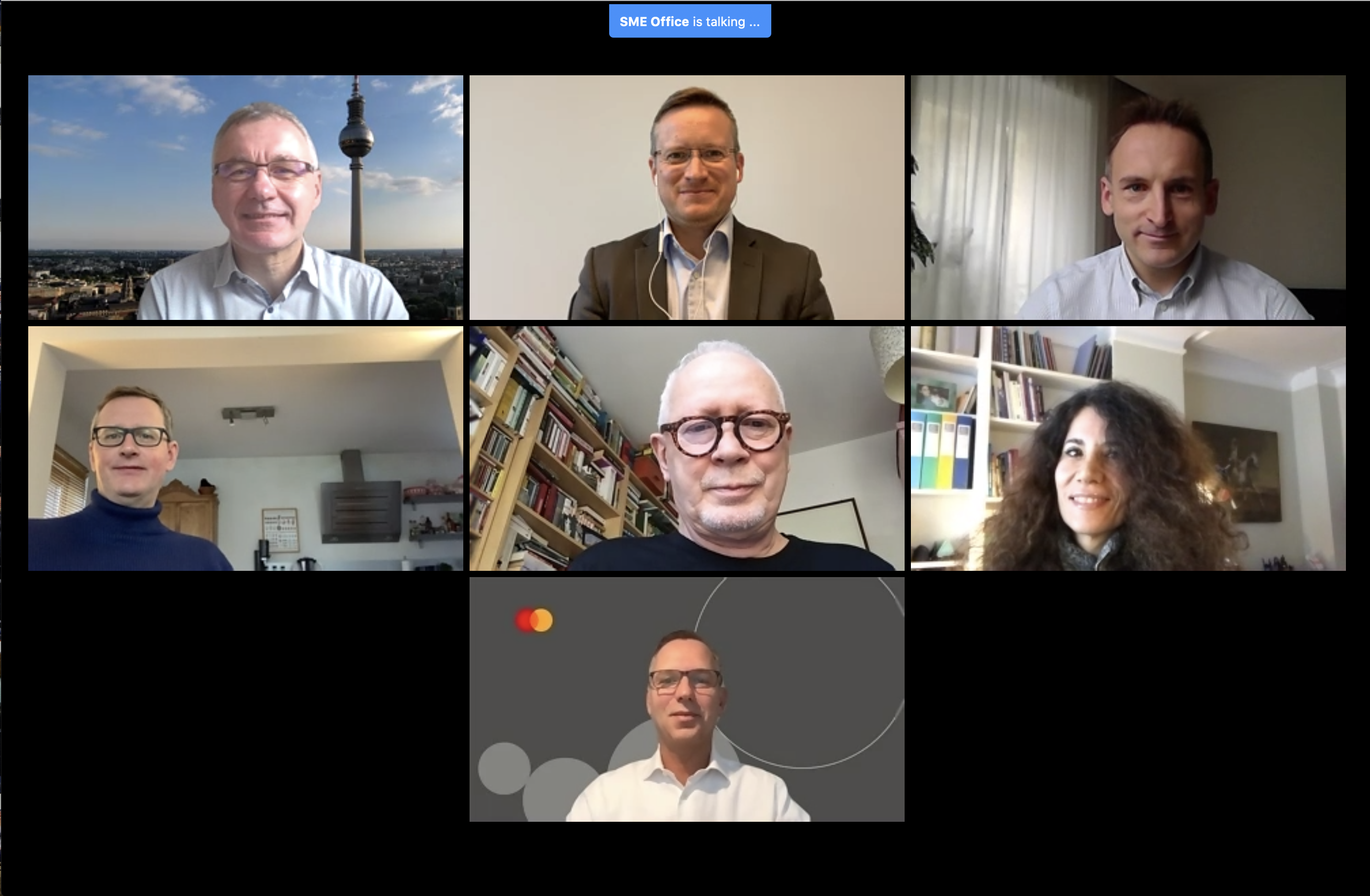Digital Payments Post-COVID: Impact on the Economy and EU Policy

COVID-19 has undeniably disrupted our everyday life and longstanding social conventions, methods of payment included. With the risk of contagion associated with banknotes and physical contact at point-of-sale, the use of electric payments has risen for in-person transactions even where previously cash was traditionally preferred. It’s now time to follow up on the digital transformation in this field by developing an adaptable regulatory framework and creating appropriate and resilient infrastructure to support it. These changes, done at a European level, will encourage the adoption of digital payment methods by SMEs and enable capability-building at a micro-level.
Moderated by MICHAL BONI, First Minister of Administration & Digitalisation of Poland 2011-2013, MEP 2014-2019, SME Connect Special Advisor for Digitalisation & AI, the Virtual Meeting saw such high-level speakers such as ONDREJ KOVARÍK MEP, ECON Committee, Rapporteur Report with Recommendations to the Commission on Digital Finance, Chair SME Connect Working Group Access to Finance for SMEs; JÜRGEN GÖBEL, Business Development Director, Ingenico Group Board Member Initiative Deutsche Zahlungsysteme, Member of the Executive Committee of European Vending Association (EVA); ARNE PACHE, Vice-President Global Products & Solutions, MasterCard; CEU PEREIRA, Team Leader Retail Payments, Directorate General for Financial Stability, Financial Services and Capital Markets Union, European Commission; MARCIN NOWACKI, Vice-President Union of Entrepreneurs and Employers (ZPP); STEFAN BERGER MEP, ECON Committee.
In his opening speech, ONDREJ KOVARÍK MEP introduced his report that in a way represents the European Parliament’s vision of the future policy action in this area. He believes that the data is key for the development of financial services in Europe, it has to be carefully accessed, handled and analyzed. He also highlighted the fact that the development of digital financial infrastructure and digital financial services can on one hand be the core of a company and on the other hand it can be something that can enhance the functioning of an SME in the long term. Besides this he also highlighted the importance of improving the cyber-security aspect as more and more companies have digitalized in terms of payment methods and financial infrastructure, which made them more vulnerable to cyber threats. He believes that governments support and promote the innovation of SMEs because they have the tremendous capacity to uptake new technologies very fast.
Berlin based, JÜRGEN GÖBEL speaks about how drastically card and phone payment methods have gained popularity among Germans throughout 2019 and 2020, especially during the COVID-19 crisis. He also introduces the idea of launching the European Payments Initiative, which aims at creating a unified payment solution across Europe. This topic is quite important as the trend of cashless payment will become even more wanted and needed in the near future, even after the crisis ends.
ARNE PACHE suggests the policy makers to make the freedom of choice in payment solutions mandatory, since many stores still require cash to be used. The key benefits mentioned were hygiene, safety and security (combating money laundering and shadow economy), innovation (electronic payments drive new business models). Concluding his speech, he mentions the need to focus on operational issues and make those issues more European, not only addressed to one country, specific groups or specific retailer chains.
CEU PEREIRA assured that the commission completely agrees on the crucial importance the digital payment system and introduced their user-centric Retail Payment Strategy which will ensure the shift to digital payment to be more efficient, faster, more convenient and secure. The strategy is also about making the EU a global leader in payments (ex. by improving cross-border payments) and at the same time still respect cash use because it is still dominant in the EU. The 4 pillars of the European Commission’s RPS: 1. leveraging on the instant payment technologies as it is a very powerful tool for SMEs; 2. working on the cybersecurity aspect of moving to digital payments; 3. interoperable and accessible infrastructure; 4. external dimension;
Continuing the discussion, MARCIN NOWACKI adds that paying cashless should be promoted strictly by choice, the new solutions shouldn’t be implemented by force, because at the end we have consumers, on whose behavior SMEs depend. It is important to adjust to them and to their expectations.
To wrap up, STEFAN BERGER MEP states the obvious that the European society will change in more or less paying cashless. As a result of that, political institutions have to build an answer to that for the European banking families, credit card family and the SMEs to cope with this new situation and continue their business.